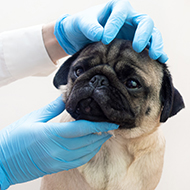BWG launches tool to help owners choose healthy dogs

"As well as causing a lifetime of pain and suffering for the dog, getting the decision wrong can lead to serious heartbreak for the owner too" - Dr Dan O'Neill.
The Brachycephalic Working Group (BWG) has released a new tool to help prospective dog owners choose healthy breeds when selecting their new furry friend.
Comprised of veterinary surgeons, dog breeders, welfare charities, academics, breed clubs and Defra, the BWG aims to improve and protect the health and welfare of brachycephalic dogs to improve conformation-related health issues. The group also aims to reduce the current trend of owning brachycephalic dogs.
Named the 'innate health' tool, it highlights some of the basic bodily functions that all dogs should be expected to show including, the ability to blink fully, the ability to breathe easily and exercise without difficulty.
Also highlighted in the tool are the ability for dogs to sleep without difficulty, the ability to flex their backs and having a tail to wag.
Chair of the BWG, Dr Dan O'Neill, explained: “Would-be owners should focus on the life that the dog will live; the dog’s good health must be the number one priority.
“Our new BWG innate health tool, based on decades of research, helps owners assess the body shape of different types of dogs out there and ask themselves basic but critical questions about how these body shapes could compromise the health of the dog.”
Dr O'Neill highlighted the usefulness of the tool for veterinary professionals when advising prospective owners: “During 20 years in general veterinary practice, countless owners have asked me ‘How do I pick a healthy dog?’ Well, the great news is that the new innate health tool allows owners to finally do just that.
“Of course, once an owner had identified a type of dog with good innate health, consideration also needs to be given to the temperament and character of the dog, as well as how to responsibly source their new dog.”
Addressing potential dog owners, Dr Justine Shotton, president of the British Veterinary Association (BVA), said: “Breeding and hereditary defects are a top concern for vets and, as a practising vet, I often see the heartache and welfare concerns that come from health issues that are a result of the way a dog has been bred.
“The new tool released by BWG should be useful for anyone looking to add a dog to the family. If the answer to any question is a negative, you should stop and carefully research the potential health and welfare issues that dog is likely to face and consider a healthier alternative.
“Alongside the tool, you should also reach out to your local vet practice for advice and information about dog health and welfare and breed-related health issues.
“Once you have considered innate health in your decision making, it is then equally important to use the free Puppy Contract to ensure you are buying a happy, healthy and well socialised puppy from a responsible breeder.”



 The Veterinary Medicines Directorate (VMD) is inviting applications from veterinary students to attend a one-week extramural studies (EMS) placement in July 2026.
The Veterinary Medicines Directorate (VMD) is inviting applications from veterinary students to attend a one-week extramural studies (EMS) placement in July 2026.